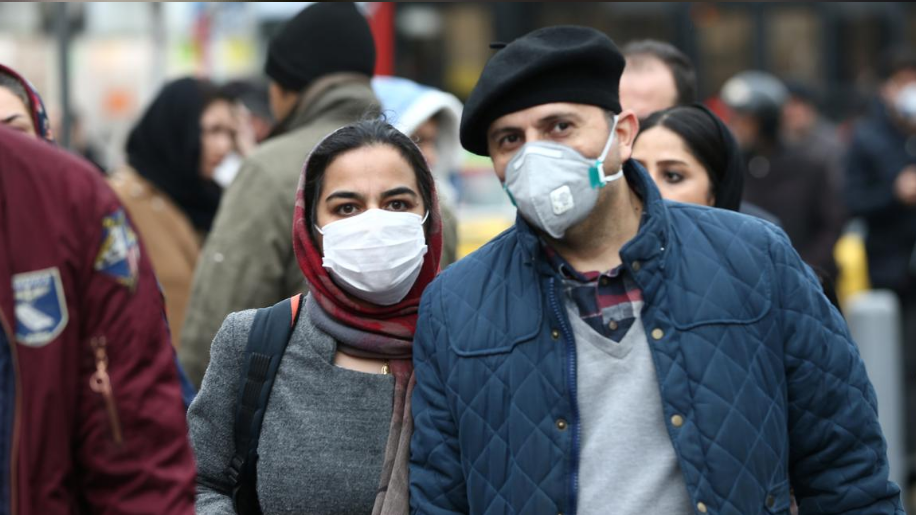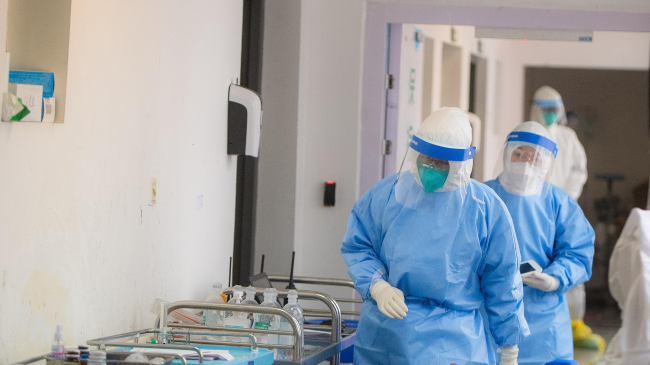
An Iranian couple wear face masks at the Grand Bazaar in Tehran, Iran, February 20, 2020. /Reuters
An Iranian couple wear face masks at the Grand Bazaar in Tehran, Iran, February 20, 2020. /Reuters
Editor's note: Ren Zheng is a Ph.D. student, majoring in American politics and international strategy at the China Institute of Contemporary International Relations. The article reflects the author's opinion, and not necessarily the views of CGTN.
As the number of novel coronavirus cases and affected countries has increased during the last few days, the World Health Organization (WHO) raised its risk assessment of COVID-19 from "high" to "very high" at the global level on Feb 27, 2020. Up to now, the novel coronavirus pneumonia (NCP) epidemic has spread to 64 countries and regions across 6 continents with the only exception of Antarctica, which means that it is only a matter of time for epidemic to ferment into a global infectious disease.
To stifle the spread of epidemic, many people have chosen to self-isolate. However, what needs to be isolated is the virus, not the love. "Pneumonia would give birth to love stories", Columbian author Gabriel García Márquez wrote in "Love in the Time of Cholera." This book is from the perspective of human emotions. But when it comes to international relations in the time of cholera, how to scrutinize the international order, and whether will the epidemic begin a new chapter?
It should be recognized that the epidemic is not only a test for human beings' ability in science and health protection, but also one for the international order – whether it is efficient enough for every nation to build strong power together against the epidemic at this critical moment.
Global challenges are increasing
COVID-19 is not the world's first public health emergency, similar events have sometimes happened in human history. However, the current epidemic is likely to have a larger effect than previous historical events, which could tell us a little about its health and economic implications in the context of global narratives. In recent years, there have in fact been more and more global black swan events and unpredictable challenges.
People may still have fresh memories of the global financial crisis in 2008, which not only revealed significant weaknesses in the financial system, but also caused a significant drop in levels of public trust and confidence in financial institutions. Economic globalization shaped such an interconnected market, through which any financial shock will soon spread across the world. It is vital that we find ways to avoid new financial challenges becoming next crisis.
Climate change is another global challenge. As a result of human activity, there have been so many drastic changes to the climate. Weather events such as droughts and storms are becoming more frequent and intense. We're already seeing and feeling the impacts of climate change, such as Australia's deadly wildfires, Antarctic's melting icebergs and the invasion of desert locusts.
History cannot be rewound
Thanks to technological advances and increased connectivity, countries are closer to each other than ever. However, the world seems to be experiencing a globalization backlash since the 2008 financial crisis. Many countries have tightened up on trade negotiations and foreign policies. Donald Trump's "America First" agenda and Britain's separation from the European Union are two typical examples of the rising trend of nationalism and anti-globalization.
The U.S. has been pushing forward the technical divide between the U.S. and China from the beginning of 2020, even COVID-19 has been made use of by Trump administration. Just as China was fully fighting the epidemic, to the world's surprise, U.S. Secretary of Commerce Wilbur Ross said that the epidemic would "help accelerate the return of manufacturing to the United States," which is both ridiculous and cold-blooded.

Medical personnel wear protective suits at Wuhan Union Hospital, Hubei Province, January 28, 2020. /AP
Medical personnel wear protective suits at Wuhan Union Hospital, Hubei Province, January 28, 2020. /AP
Since the outbreak of the epidemic, western media has publicized conspiracy theories and made discriminatory remarks surrounding it, believing that the epidemic will accelerate the decoupling of China's industrial and supply chains with developed countries, triggering a decoupling between China and the rest of the world. Undoubtedly, the epidemic will affect China's economy to some extent. However, the world's largest manufacturing industry chain built since China's reform and opening up is unlikely to fall apart due to the epidemic. What's more, history cannot be rewound. Confronted with increasing global challenges, there should be better management of globalization in an interdependent world.
A global community with a shared future is the rational choice
According to Hedley Bull, the international order is a pattern of behavior that pursues the basic or main goals of the international community. In the era of globalization, human beings are living in a global village where we not only share the same welfare and responsibilities, but also face the same challenges. Any disease and disaster is against the entire human race, no nation, society or individual can be isolated from various uncertainties and threats. As a rational choice for international order, building a community with a shared future for mankind is the major undertaking of the time.
Actually, the idea of "a community with a shared future for mankind" has a long history. From Chairman Mao's "Warm and cold, we share together" to the popular "Rivers low, mountains high, the same moon in the sky" used by Japanese when donating masks to China recently, all these notable phrases tell us to treat each other in the spirit of mutual respect, equality, openness and inclusiveness.
What China is doing now well explains the claim of building a community with a shared future for mankind. China identified the pathogens, shared the genetic sequence of the novel coronavirus with the world, and sent coronavirus test kits to other countries. Cooperation and solidarity are the sharpest weapons against the epidemic. For the well being of the human race, the world must choose to stand together.
"We have a choice. Can we come together to face a common and dangerous enemy? Or will we allow fear, suspicion and irrationality to distract and divide us?" This was the question raised by WHO Director-General Tedros Adhanom Ghebreyesus at the 56th Munich Security Conference. "A community with a shared future for mankind" should be the best answer.
(If you want to contribute and have specific expertise, please contact us at opinions@cgtn.com.)